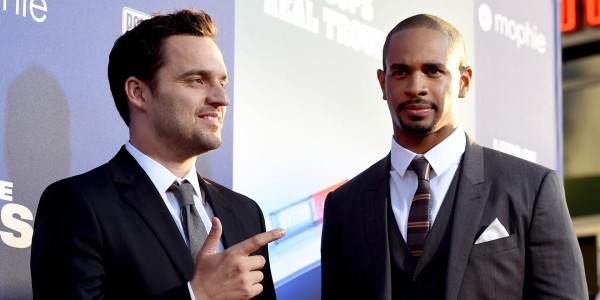Now that we’re done celebrating the end of the writers strike, it’s time to cart the empties out to the curb, clear our heads, and take stock of what we learned the past three months.
Above all, we learned that writers are important to television.
This is no scoop, but it was never so evident to most of us before.
Maybe that’s because, as viewers, we typically overlook writers. We do it in the same spirit we set aside our knowledge that Teri Hatcher and Felicity Huffman aren’t really neighbors on Wisteria Lane. Or that all those people on “Lost” aren’t stranded in the middle of nowhere. Or that the droll, British-born Hugh Laurie isn’t a cranky American doctor with a limp.
The same “willing suspension of disbelief” that enables an audience to buy into a comedy or drama also calls for our fooling ourselves into thinking that the action is determined by the on-screen characters.
Even lots of TV series that are labeled “unscripted” or “reality” have writers behind the scenes, as we were also reminded during the strike. The fact that they aren’t members of the Writers Guild of America and therefore weren’t on strike doesn’t mean what they do isn’t writing. And the fact that they may toil in total anonymity doesn’t make them any less essential to a project that officially denies they exist.
‘American Revivals’The necessity of writers was brought home during their previous strike, in 1988, when NBC head Brandon Tartikoff struck back by threatening to unearth decades-old TV scripts and shoot them again. “American Revivals,” he was going to call them.
It never came to that.
Nor did it this time, of course. The networks had too many other ways to plug the holes.
For instance, all those reality shows. Like “My Dad is Better than Your Dad,” which, premiering Monday on NBC, pits dads against one another in idiotic stunts ostensibly to win their kids’ approval. (Msnbc.com is a joint venture between Microsoft and NBC Universal.)
Grown men bobbing for snakes or wallowing in green goo in front of their families, not to mention America — this ill serves the dignity of fatherhood. But fathers are fated to play the fool on TV. We didn’t need the strike to tell us that.
The networks have seized on other stopgaps. NBC reclaimed “Law & Order: Criminal Intent,” the drama it had previously banished to its cable-network sister, USA.
NBC also announced plans to air episodes of two other USA series, “Psych” and “Monk.”
And starting Sunday, CBS will recycle the first season of “Dexter,” the drama about a serial murderer that originates on Showtime, CBS’ premium cable network.
Hmmmmm. We’re talking American Revivals here.
Low expectations
What other wisdom does the strike leave us with?
Slideshow 26 photos
Celebrity Sightings
Well, we know to keep our expectations low for network news.
Last month, “Dateline NBC” took a break from baiting pedophiles for a two-hour infomercial about the Golden Globes. This was part of the network’s Golden Globes “coverage” cobbled together after the gala awards ceremony, which NBC had bought the rights to broadcast, fell prey to the strike and was canceled. “Dateline” bounced back with the sprightly titled “Going for Gold,” hosted by “Today” anchor Matt Lauer. The result was interviews-and-clips fluff trading on what’s left of NBC News’ stature.
But those of us who were surprised by such a display had only ourselves to blame. By now we all know (or should) that network news has a fiduciary duty to serve the business interests of the rest of the company. For us to assume otherwise is naive, and, if we did before, the strike-afflicted Golden Globes set us straight.
The strike threw us a curve in late-night. Even without writers, Jay Leno’s “Tonight Show” stayed ratings champ against David Letterman’s “Late Show,” whose writers returned in January thanks to an interim agreement with the guild.
All the more remarkable: Night after night, Leno somehow turned out a monologue written without his staff.
Most remarkable of all: Leno’s show, however lousy, was no worse than it had ever been.
What this tells us is hard to say. But the strike has left many questions unanswered.
One of the thorniest: What does TV’s future look like amid more and more viewing options?
NBC’s strike-spurred acquisitions included “quarterlife,” a drama series about attractive singles in their twenties trying to chart their lives and careers. It was created by acclaimed TV veterans Ed Zwick and Marshall Herskovitz (“thirtysomething,” “My So-Called Life”), who introduced it online last November on its own eponymous Web site.
Beginning Feb. 26, “quarterlife” migrates to broadcast TV. On NBC it can spread the word that the Internet that spawned it is a breeding ground for worthwhile entertainment — and that, more and more, the Web is an alternative to watching TV.
Yet another lesson in the strike’s aftermath.
